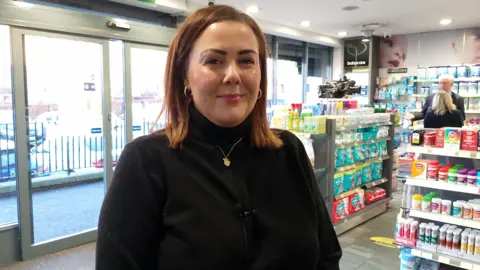Flu vaccine now extended to people aged 50-64
 BBC
BBCEveryone eligible for the flu vaccination has been urged by the Public Health Agency (PHA) to take up the offer as the jab is extended to people aged 50-64.
People in that age range will be able to get jabbed at their GP practice, a participating community pharmacy or health trust vaccination clinic.
Other groups eligible for free flu vaccinations include health and social care workers.
Dr Joanne McClean, director of public health at the PHA, said: "Vaccination lowers your chances of having serious complications or dying from winter viruses.
"This is especially true for people who are at high risk of complications. The sooner you do this, the sooner you will help protect yourself."
The PHA said not everyone who was eligible for the flu vaccination had come forward.
It advised people to make arrangements now to get it ahead of an anticipated increase in demand.
"If you are in one of the groups currently eligible for the winter vaccines, don't delay in getting vaccinated, as it could mean the difference between life or death this winter," Dr McClean said.
In recent weeks, flu and respiratory infections have been affecting many people with some requiring hospital treatment.
Christopher Connor, 51, got the vaccine on Wednesday morning.
"I think it's very important that people in the new age group get it and everybody does what they can to help each other," he told BBC News NI.
"It's very important to keep other people safe, especially with covid and different things going about."
"I've a wife and kids, I want to keep them safe."
'Suffering from vaccine fatigue'

Rachel Spiers, immunisation and vaccination programme manager at the PHA, said she would encourage people to get the protection they are being offered.
"I think potentially there is a level of complacency, I think many people are suffering from vaccine fatigue," she said.
"We have had a lot of vaccines recently but the flu vaccine is a new vaccine every year – so getting a top-up every year is really important.
"It's never too late to get vaccinated."
'Get the jab to protect the health service'
Chief medical officer Sir Michael McBride was one of the first in the new age group to receive the flu vaccination.
He was given his jab at Woodbourne pharmacy in west Belfast on Wednesday.
The pharmacist there said the uptake for vaccines had been extremely low this year compared to previous years.
There is a push to get more people to receive the flu vaccination given the levels of flu seen in our hospitals and the pressure being felt particularly in emergency departments.
Sir Michael says he's not surprised at the level of flu in hospitals at the minute as it's "unpredictable".
He said that the health service was finely balanced and it did not take much to tip it over.
"People are still in emergency departments with the flu and it's important people get the flu jab now to protect the health service," Sir Michael said.
"Flu season isn't over.
"We are appealing for people to come forward to protect themselves."
How do you get a flu vaccine?
The Public Health Agency (PHA) is urging people to get the vaccination to protect themselves and those around them.
The most vulnerable groups were prioritised, allowing the programme to be extended, the PHA said.
The jabs are available through GP surgeries, community pharmacies and local HSC Trust clinics.
Other groups eligible for free flu vaccinations include health and social care workers.
Those eligible for the flu vaccine are:
- All adults age 50 and over
- Anyone aged six months to 50 in a clinical risk group
- Pregnant women
- Residents and staff in a care home for older adults
- All health and social care workers
- All preschool children aged two to four years
- All primary and secondary school children (up to and including year 12)
- Carers
- Close contacts of immunocompromised individuals
- High risk poultry and avian animal health workers
